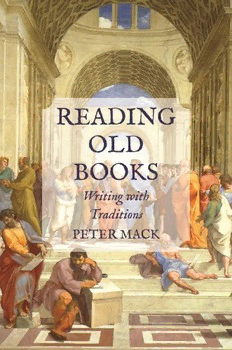
Reading old books: writing with traditions PDF
Preview Reading old books: writing with traditions
Reading Old BOOks Mack.indb 1 6/20/2019 8:12:41 AM Mack.indb 2 6/20/2019 8:12:41 AM Reading Old Books WRiting W ith tR aditiOns Peter Mack PRincetOn UniveRsity PRess PRincetOn & OxfORd Mack.indb 3 6/20/2019 8:12:41 AM Copyright © 2019 by Princeton University Press Published by Princeton University Press 41 William Street, Princeton, New Jersey 08540 6 Oxford Street, Woodstock, Oxfordshire OX20 1TR press.princeton.edu All Rights Reserved Library of Congress Control Number 2019931722 ISBN 978- 0- 691- 19400- 4 British Library Cataloging- in- Publication Data is available Editorial: Ben Tate and Charlie Allen Production Editorial: Jill Harris Jacket Design: Layla Mac Rory Production: Merli Guerra Publicity: Alyssa Sanford and Katie Lewis Copyeditor: Cynthia Buck Jacket art: Raphael, The School of Athens, c. 1509–1511. This book has been composed in Miller Printed on acid-f ree paper. ∞ Printed in the United States of America 10 9 8 7 6 5 4 3 2 1 Mack.indb 4 6/20/2019 8:12:41 AM For Vicki Behm Mack.indb 5 6/20/2019 8:12:41 AM Mack.indb 6 6/20/2019 8:12:41 AM cOntents Preface · ix Introduction: Ideas of Literary Tradition 1 chaPteR 1. Petrarch, Scholarship, and Traditions of Love Poetry 27 chaPteR 2. Chaucer and Boccaccio’s Il Filostrato 56 chaPteR 3. Renaissance Epics: Ariosto, Tasso, and Spenser 97 chaPteR 4. Reading and Community as a Support for the New in Elizabeth Gaskell’s Mary Barton 136 chaPteR 5. European and African Literary Traditions in Ngũgĩ wa Thiong’o’s Wizard of the Crow 169 Conclusion: Writers’ and Readers’ Traditions 195 Notes · 209 Select Bibliography · 227 Index · 233 [ vii ] Mack.indb 7 6/20/2019 8:12:41 AM Mack.indb 8 6/20/2019 8:12:41 AM PReface this BOOk seeks tO UndeRstand the ways in which literary tradition has been and can be useful. It argues that literary tradition provides essential imaginative resources for writers and readers. Writers use earlier books for plots, for phrases, for ideas to copy or contradict, for moral support, and for lessons in becoming better writers. This book investigates how writers learn from and use their predecessors, and how readers use the idea of a literary heritage, in order to argue for the importance of tradition to readers and writ- ers. We need to be critical of how, and why, the word “tradition” is used by writers or critics, but we cannot allow that necessary wari- ness to blind us to the ways in which writers make use of earlier texts to make meanings and to create new works. Nor can we afford to ignore the role of reading earlier texts in helping us understand new writing. In the introduction, I investigate the history of the word “tradi- tion,” the ways in which over the last 160 years the word has been applied to literature, and the opinions of a range of sociologists, historians, philosophers, and critics on the use and value of tradi- tion. Some of my sources for this introductory discussion were sug- gested by a critic’s part in establishing the significance of literary tradition (Sainte-B euve, Eliot, Leavis); others by people with whom I discussed my ideas (Gadamer, Adorno, Ferrante, Hobsbawm and Ranger, MacIntyre, Shils), and still others by my reading around the subject. Late in the day I remembered that E. R. Curtius had some interesting things to say on traditions and canons.1 In the introduction, I emphasize the importance of studying the process by which the later reader or writer uses the older text, the freedom which the writer enjoys in choosing both a text to follow and the way in which to exploit it, and the different uses which readers and writers make of tradition. For one can best understand how tradi- tion works by studying a later writer’s use of an individual text. The requirement that a writer (or reader) should somehow possess a [ ix ] Mack.indb 9 6/20/2019 8:12:41 AM
